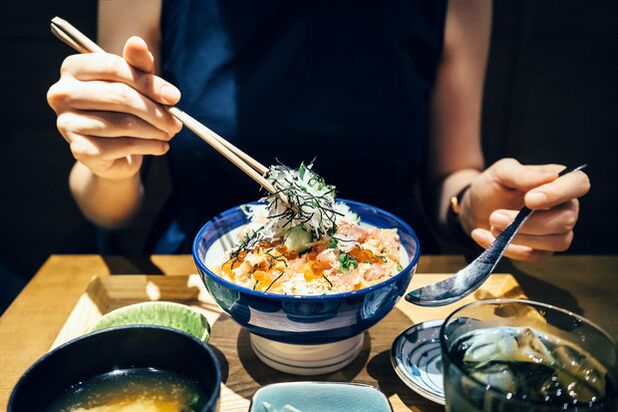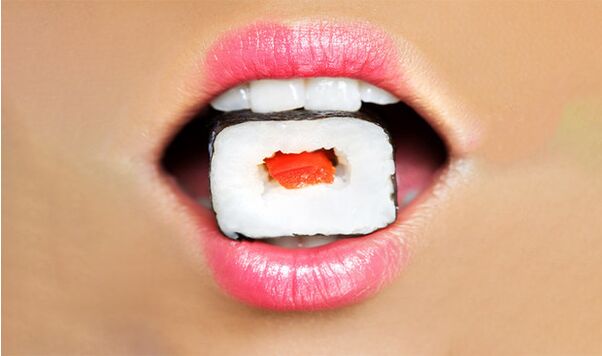The Japanese are famous for harmonious physique and long life expectancy.The editors turned to the candidates for medical sciences, a doctor of sports medicine and sports dietet, an expert ditite of the Federal Network of Fitness Club to find out about all the characteristics of nutrition.
The essence of Japanese nutrition is the introduction of metabolism.You must clearly stick to the menu without changing the sequence of days or a number of products and clearly observing the cooking rules.This diet can be named as Bessolev, precisely because of the fact that they drink a lot and do not consume salty foods, but are literally washed out.

The diet is based on an increase in proteins in the diet and limitation of fats and carbohydrates.The basis for your menu should be fish, chicken, beef, eggs, cheese and kefir with a low percentage of fat content.Vegetables are not prohibited in moderate size fruits.The list of what you have to reject is much wider, as with every diet.
Forget salt, sugar, spices (you let them eat more than you have to satisfy hunger), leave smoked meat, bread, bananas and grapes in the store.
The Japanese woman, as this diet was lovingly called, threatens dehydration.It is therefore particularly important that these 14 days drink at least 2 liters of water per day.
You shouldn't stay hungry at the expense of the protein - it saturates well, the permissible cheese gives the body the required minimum fat and the vegetables - fiber and carbohydrates.
The Japanese diet menu is designed for a week, according to which it is planned to repeat the last few days.During the diet, snacks and all deviations from the proposed menu are strictly prohibited, otherwise the result is anything but expected.
What they promise
Duration of Japanese nutrition: from 7 to 14 days.No longer!
How much can you throw away: Up to 8 kilograms.
Special features: Available.
Disadvantages of Japanese nutrition:A very strict diet, it is difficult to stand and not to break.
Some experts argue that Japanese nutrition improves the metabolism for up to two years, i.e. tortured for two weeks, and the result will take place for a long time.
Characteristics of the diet of the residents of Japan
Japan is a country with long runs.The average life expectancy of women is 87 years old, and this is more than in any other country in the world.What is the reason for such incredible life expectancy?Researchers believe that the reason in the lifestyle is in general and in the culture of nutrition in particular.

First, the food is cooked in Japan, steamed and steamed, but not fried with a large amount of oil.This distinguishes Japanese cuisine radically from western and even Chinese, in which all dishes are very fat.
Second, there is a wealth of fresh seasonal products in combination with products from different colors in Japanese nutrition.The principle of diversity thus forms the basis for a healthy diet of the Japanese.
Third, the size of the part of the Japanese is low, and in this distinction they differ radically from the residents of the countries of other countries.The desserts in Japan are much smaller than traditionally western and huge parts to which the residents of some countries are used to (for example 400 grams of pork bar) are completely unacceptable for the Japanese.
Japanese diet underwater stones
"The problem is that Japanese nutrition has nothing to do with the Japanese diet," comments an expert-dietic legend, the diet was developed in a certain Japanese clinic.However, there is no description of this clinic or address on an English -language or Russian -speaking website.At the same time, by entering a phrase with the name of this clinic in each search engine, you will find more than a thousand monotonous texts with a description of the Japanese diet.Nevertheless, I can confidently say that the Japanese diet does not exist if I can rely on my medical experience.I will give the justification of my position.
- The Japanese diet is a low calorie diet that is designed for 7 to 14 days.During this time you can really throw a few kilograms because every strict restriction leads to weight loss when eating.However, fat tissue is not just an additional substance, but the most important endocrine organ.A sharp liberation from several kilograms is affected with an imbalance of the hormonal regulation of the metabolism.
- This is a low carbohydrate diet.However, carbohydrates together with proteins and fats are an important part of the nutrition.In addition, carbohydrates are an energy source that we use every day for both the spiritual and physical work.An alternative energy source in the form of fats in Japanese nutrition is not included.
- This is a diet that essentially does not offer breakfast because it is difficult to name black coffee or vegetable breakfast.Breakfast, however, is the main meal, thanks to which we receive all the necessary components of the nutrition (proteins, fats and carbohydrates) for an appropriate functioning in the first half of the day.
- This is finally a diet.Every diet based on restrictions does not take into account the rules of food behavior and healthy diet.This leads to the fact that the classic mechanism is "decreased in a diet - got better after the diet".
Therefore, it does not differ from other diets that have no worthy justification: they are united by slogans who guarantee a quick loss of 10 kg per week and at the same time do not take into account the consequences of strong weight loss for human health.
In any case, preparations for nutrition should be thorough.It is better to consult your doctor before going to Japanese food.You can try such a diet if you have no contraindications: pregnant women, breastfeeding mothers, with liver diseases, kidneys, gastritis and ulcers should not switch to such a hard diet.

Japanese diet during the day
The first day
Breakfast: Black coffee (always only without sugar and milk).
Dinner: 2 hard cooking eggs, cooked cabbage salad (plant salads are seasoned with vegetable oil) and a glass of tomato juice.
Dinner: 250 g cooked or fried fish.
The second day
- Breakfast: Black coffee and a piece of rye bread.
- Dinner: 250 g of cooked or fried fish, cooked cabbage salad.
- Dinner:100 g of cooked beef and a glass of kefir.
The third day
- Breakfast: Black coffee and a piece of rye bread.
- Dinner: Big zucchini fried with vegetable oil.
- Dinner: 2 hard -boiled eggs, 200 g unsalted cooked beef, raw cabbage salad.
The fourth day
- Breakfast: black coffee.
- Dinner: 1 egg, 3 carrots and 15 g cheese.
- Dinner: 200 g fruit.
Fifth day
- Breakfast: Grated carrots with lemon juice.
- Dinner: 200 g cooked or fried fish and a glass of tomato juice.
- Dinner: 200 g of fruit.
Sixth day
- Breakfast: black coffee.
- Dinner: 400 g of unsalted chicken, a salad made of fresh cabbage and carrots.
- Dinner: 2 eggs are screwed and fresh carrots.
Seventh day
- Breakfast: Tea.
- Dinner: 200 g unsalted cooked beef, 200 g fruits.
- One of the previous dinner.
There are quite a few contraindications in this diet, from gastric diseases to youth or pregnancy.Before the application is a doctor's consultation.
Eighth day
- Breakfast:black coffee.
- Dinner:500 g of cooked chicken and a salad made of carrots and cabbage.
- Dinner: Fresh carrots and 2 cooked eggs.
Ninth day
- Breakfast: Grated carrots with lemon juice.
- Dinner: 200 g cooked or fried fish and a glass of tomato juice.
- Dinner: 200 g fruits (you can make a salad).
Tenth day
- Breakfast: black coffee.
- Dinner: 3 cooked carrots, 1 cooked egg and 50 g cheese.
- Dinner: 200 g fruit.
The eleventh day
- Breakfast: Black coffee and a piece of rye bread.
- Dinner: Big zucchini fried with vegetable oil.
- Dinner:200 g cooked, unsalted beef, 2 hard eggs and fresh cabbage salad.
Twelfth day
- Breakfast: Black coffee and a piece of rye bread.
- Dinner: 200 g cooked or fried fish with fresh cabbage salad.
- Dinner: 100 g cooked unsalted beef and a glass of kefir.
The thirteenth day
- Breakfast: black coffee.
- Dinner: 2 cooked eggs, boiled cabbage and a glass of tomato juice.
- Dinner: 200 g cooked or fried fish.
Fourteen day
- Breakfast: black coffee.
- Dinner: 200 g cooked or fried fish, fresh cabbage salad.
- Dinner: 200 g cooked beef, a glass of kefir.































